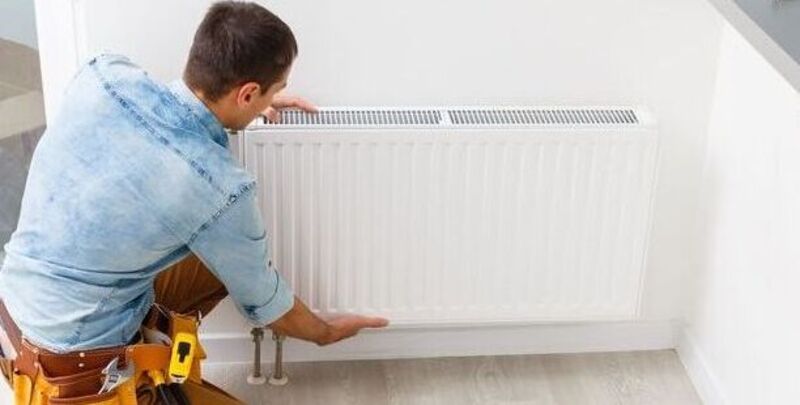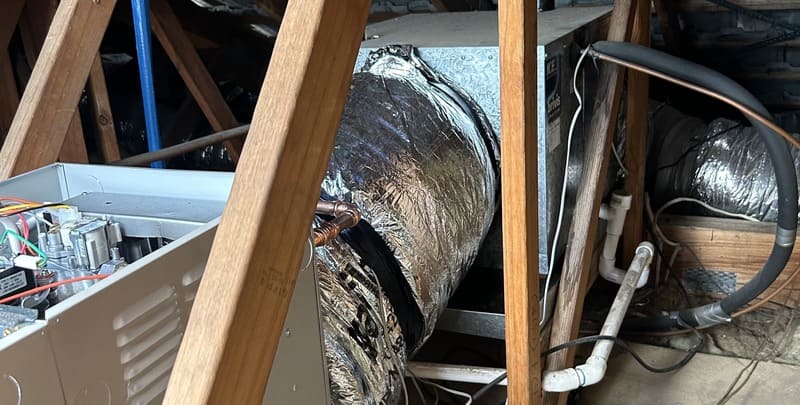Space Heaters vs Gas Heat: Which is Best for Your Home?
Published on : April 24th, 2024

Have you considered all the options on the market for keeping your home warm and cosy during the colder months?
Picking the right heating setup for your home is a big deal. Aside from reverse cycle air conditioning, the real choice comes down to weighing the pros and cons of space heaters versus gas heat.
A Closer Look at Space Heaters
Navigating the world of space heaters requires a closer examination of their types, functionalities, and suitability for various spaces. Let’s start with how space heaters work as well as their types.
How Space Heaters Work
Space heaters operate through various mechanisms, including electric, infrared, and ceramic heating. Electric heaters convert electricity into heat, infrared heaters use electromagnetic radiation, and ceramic heaters use ceramic elements to produce rapid and even heating.
Types of Space Heaters
Choosing the right heating solution for your home involves considering various types of space heaters, each with its unique characteristics.
- Fan heaters: Fan heaters operate by using an electric fan to blow hot air down over a heating element, swiftly distributing warm air throughout the space. While they offer fast heating in a compact design, they can be noisy, and the warmth may not be retained for an extended period.
- Oil heaters: Oil heaters feature oil-filled fins that are heated to radiate warmth. Known for providing consistent and gentle heat, they are energy-efficient with quiet operation. However, they may take a bit longer to reach the desired temperature compared to fan heaters.
- Radiant heaters: Radiant heaters emit infrared radiation, directly warming objects within their line of sight. Offering instant warmth and quiet operation, they are suitable for spot heating. However, their range may be limited, making them less effective for larger spaces.
- Convection heaters: Convection heaters warm the air, creating a convection current that circulates heat throughout the room. Ideal for larger spaces, they provide even heating with quieter operation compared to fan heaters. However, they may take some time to fully heat a room.
- Ceramic heaters: Ceramic heaters utilise a ceramic heating element and a fan to distribute warm air. Offering quick heating and energy efficiency, they often come equipped with a thermostat for temperature control. However, they can be somewhat noisy during operation.
- Micathermic heaters: Micathermic heaters combine convection and radiant heating, using a heating element with a layer of mica for efficient warmth. Providing quick and even heating, they are energy-efficient and often have a slim and portable design. However, their range may be limited.
- Wall heaters: Wall heaters are installed directly on walls and can be either fan-forced or convection heaters, suitable for heating specific areas. They save floor space, can be hardwired, and often include a built-in thermostat. However, installation may require professional assistance.
Understanding these different types of space heaters and their characteristics will help you make an informed decision based on factors such as room size, energy efficiency, noise level, and heating preferences.

Pros and Cons of Space Heaters
Before investing in a space heater, it’s crucial to weigh the pros and cons, such as the following.
Pros of Space Heaters:
- Portability: One of the primary advantages of space heaters is their portability. Most models are compact and lightweight, allowing users to move them easily from room to room based on heating needs.
- Quick heating: Space heaters provide rapid heating, making them ideal for quickly warming up a specific area or room. This feature is particularly beneficial during colder months.
- Energy efficiency: Many modern space heaters are designed to be energy-efficient, allowing users to heat small spaces without the need to warm the entire house. This targeted heating can result in cost savings.
- Cost-effective: In terms of upfront costs, space heaters are generally more affordable than central heating systems. They are a cost-effective option for supplementing heating in specific zones.
- Variety of types: Space heaters come in various types, including fan heaters, oil heaters, radiant heaters, convection heaters, ceramic heaters, micathermic heaters, and wall heaters. This variety allows users to choose a model that best suits their preferences and needs.
- Ease of installation: Most space heaters are plug-and-play devices, requiring minimal installation. Users can simply plug them into a power outlet, making them a convenient and accessible heating option.
Cons of Space Heaters:
- Limited coverage: The heating range of space heaters is generally limited to the immediate vicinity. They may not be suitable for large, open areas or for heating entire homes efficiently.
- Noise level: Some types of space heaters, especially fan heaters, can produce noise during operation. While technological advancements have reduced noise levels in newer models, it’s essential to consider this factor, especially for bedrooms or quiet spaces.
- Potential safety risks: Space heaters pose safety risks if not used correctly. Common risks include fire hazards, burns, and electric shocks. Users must follow safety guidelines, keep flammable materials away, and use heaters equipped with safety features.
- Energy costs: While space heaters can be energy-efficient when used to heat specific zones, they may contribute to higher energy costs if used excessively. The constant operation can result in increased electricity consumption.
- Not suitable for whole-house heating: Space heaters are designed for supplemental heating and are not suitable for providing warmth to an entire house. Relying solely on space heaters may lead to uneven heating and discomfort in colder seasons.
- Maintenance requirements: Some types of space heaters, such as oil-filled or radiant heaters, may require occasional maintenance. Dust accumulation on heating elements or fins can affect efficiency, necessitating regular cleaning.
Understanding these pros and cons will help users make informed decisions about whether space heaters are the right heating solution for their specific needs and circumstances.
Choosing the right space heater involves considerations such as heating power, safety features, and energy efficiency. Matching its higher or lower capacity heater with the room size ensures effective heating without unnecessary energy consumption.

A Comprehensive Overview of Gas Heating Systems
Gas heating systems play a significant role in home heating solutions. This section offers a thorough exploration of various gas heating systems, including how they work, their applications, and the types of spaces they are best suited for.
Different Types of Gas Heating Systems
Gas heating systems, including furnaces and boilers, use natural gas to produce heat for residential spaces. Furnaces heat air and distribute it through ducts, while boilers heat water circulated through radiators or underfloor pipes.
Furnaces heat air, distributing it through ducts, while boilers heat water, and the resulting steam or hot water is circulated through radiators or underfloor pipes.
Advantages and Disadvantages of Gas Heating
Like unflued heaters, gas heating provides effective warmth, but it comes with its set of pros and cons. Here are some to get you started.
Pros of Gas Heating:
- Effective heating: Gas heating systems are known for their ability to provide effective and powerful heating. They can quickly warm up spaces and maintain a consistent temperature, making them suitable for larger areas and entire homes.
- Energy efficiency: Natural gas, commonly used in gas heating, is a relatively clean and efficient fuel source. Gas heaters can offer high energy efficiency, resulting in cost savings and reduced environmental impact compared to some other heating methods.
- Lower operating costs: Gas heating systems often have lower operating costs compared to their electric counterparts. The cost of natural gas is generally lower than electricity, contributing to potential long-term savings on energy bills.
- Quick warm-up: Gas heaters provide almost instant warmth, ensuring that users don’t have to wait for the temperature to rise. This quick warm-up is advantageous during colder weather when immediate heating is desired.
- Whole-house heating: Gas heating systems are well-suited for whole-house heating. They can distribute warm air through ducted systems or radiators, providing comprehensive coverage for larger residential spaces.
- Reliable heating source: Gas heating is considered a reliable heating source, especially in areas where natural gas infrastructure is well-established. Users can depend on a continuous supply of gas for their heating needs.
Cons of Gas Heating:
- Initial installation costs: The upfront costs of installing a gas heating system, including purchasing the heater and setting up gas lines or ductwork, can be higher compared to some other heating options.
- Limited portability: Gas heaters, especially those integrated into a home’s central heating system, lack the portability of space heaters. Users cannot easily move them from room to room.
- Environmental impact: While natural gas is cleaner than some fossil fuels, it still contributes to carbon emissions when burned. Gas heating systems have an environmental impact, and users concerned about emissions may explore greener alternatives.
- Safety concerns: Gas heaters pose safety concerns, particularly regarding carbon monoxide (CO) emissions. Proper installation, ventilation, and regular maintenance are crucial to preventing CO build up, which can be harmful or fatal.
- Space constraints: Installing a gas heating system may require space for equipment like furnaces, boilers, or radiators. In homes with limited space, finding suitable locations for these components can be a challenge.
- Dependence on gas supply: Gas heating systems are dependent on a reliable supply of natural gas. Disruptions in the gas supply, whether due to maintenance or external factors, can temporarily leave users without heating.
Understanding these pros and cons is essential for individuals considering gas heating systems for their homes. Factors such as budget, heating requirements, and environmental considerations should be weighed carefully before making a decision.
Energy Efficiency and Environmental Impact
In the pursuit of a heating solution, considering energy efficiency and environmental impact is paramount. This section delves into the efficiency of both space heaters and gas heating systems, shedding light on their ecological footprint. Understand the environmental implications of making a choice aligned with sustainability.
- Energy efficiency: Space heaters are generally less energy-efficient compared to when gas heating systems and portable heaters are used as the primary heat source for an entire home. Gas heating systems provide more consistent and cost-effective heating for larger spaces.
- Environmental impact: Gas heating systems, especially those using natural gas, can be more environmentally friendly compared to electricity-based space heaters. However, advancements in solar power and electric heating technologies are continually improving efficiency and reducing environmental impact.

Safety Considerations
Safety is a top priority when it comes to heating your home. This section focuses on the safety aspects associated with space heaters and gas heating systems.
From precautions during operation to potential risks, equip yourself with the knowledge to ensure a secure and comfortable heating experience.
- Space heaters: Modern space heaters come equipped with safety features such as tip-over switches, overheat protection, and adjustable thermostat settings, ensuring safe operation when used correctly.
- Gas heating systems: Gas heating systems require professional installation to ensure proper ventilation and prevent carbon monoxide buildup. Regular maintenance is essential to keep the gas appliances system operating safely.
Which is Best for Your Home?
Choosing between space heaters and gas heating systems can be challenging. Whether it’s efficiency, cost-effectiveness, or environmental impact, find the insights to make an informed decision for your home.
- Home size and layout: The size and layout of your home significantly impact the choice between space heaters and gas heating systems. Space heaters are well-suited for smaller spaces, providing localised warmth and flexibility. In contrast, gas heating systems prove more effective in larger homes, distributing heat evenly across expansive areas. Understanding your home’s dimensions is crucial in selecting a heating solution that adequately meets your space requirements.
- Climate considerations: The climate in which you reside plays a pivotal role in determining the most suitable heating system. Gas heating systems excel in colder climates, delivering robust and consistent warmth even in chilly temperatures. Their capacity to maintain a comfortable indoor environment makes them a preferred choice for regions experiencing extended periods of cold weather.
- Personal preferences: Tailoring your heating solution to align with personal preferences involves considering various aspects. Installation costs, environmental impact, and maintenance requirements are critical factors that warrant attention.
Assessing your budget constraints, ecological concerns, and the level of maintenance you are willing to undertake will guide you in making a decision that aligns with your individual preferences and priorities.
Whether you prioritise cost-effectiveness, sustainability, or minimal maintenance, understanding your preferences will lead to a choice that resonates with your lifestyle and values.
Stay Warm All Winter
In the eternal debate of space heater vs flued or unflued gas heater, there’s no one-size-fits-all answer. Your choice depends on various factors, including your home size, heating needs, and personal preferences.
Evaluate the pros and cons, consider your specific circumstances, and make an informed decision to keep your home warm and comfortable. Just don’t forget to have your heater serviced regularly by qualified technicians.
Please note: This information is provided for advice purposes only. Regulations differ from state to state, so please consult your local authorities or an industry professional before proceeding with any work. See our Terms & Conditions here.